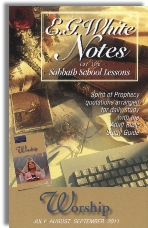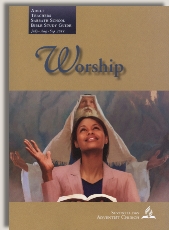|
||||||||||||||
Commentary on "Worship: From Exile to Restoration"
Day 2: Sunday, August 28, 2011 - "Son of Man, Have You Seen . . . ?"
Review
Today’s Lesson discusses how apostasy from true worship occurs gradually, step by step. Just as Israel compromised their God-given religion with the local customs and trends, so did the early Christian church fall into idolatry. Ezekiel’s vision in the 8th chapter describes the idolatrous practices that the leaders of Israel had brought into the very temple of God. The Lesson points out the irony of the people saying that God, who had proved his care and proximity to them, had abandoned them, and therefore He did not see their abominable practices. The Lesson draws the lesson here that sin can poison our minds into rationalizing even though most horrific practices.
Observations
The Lesson is right in pointing out how idolatry happens incrementally among God’s people, and that we must be vigilant against it. I was hoping that the author would give more actual examples of idolatry in the churches today. In the New Covenant, desecrating the temple of God is now an internal problem, not one of external buildings, rituals, or even behaviors. Adventist theology tends to speak of the Holy Spirit as an impersonal force that energizes the believer, instead of the living presence of the person of Jesus. When we understand His actual life in us, our concept of the sanctuary and approach into the Most Holy Place takes on a new meaning.
Christians often refer to their worship buildings as “the house of God,” an idea completely foreign to the New Testament. God does not live in buildings made by man, nor is he served by man as though he needed anything (Acts 17:24,25). The house of God is in the hearts of His people, in our spirits. This is not a physical enhancement that we nurture with wholesome food and exercise. We can only enter boldly into the presence of the Father and find help through the Spirit giving us life so we can hear the gospel:
“Therefore, brothers, since we have confidence to enter the holy places by the blood of Jesus, by the new and living way that he opened for us through the curtain, that is, through his flesh, and since we have a great priest over the house of God, let us draw near with a true heart in full assurance of faith…” Hebrews 10:19-22
Jesus is the living Way into the holiest place, through His torn, sacrificed body as our substitute. There is no other way. The “true heart” (Ez. 36:26) and “faith” (Eph. 2:8) are both gifts of the Spirit. There are no good deeds or virtuous preparations that can get us those gifts or that access into His presence, for our virtues can only offend God. Every idolatrous religion would have us earn our way into God’s favor through some virtuous pathway. Not so for the living God. Through our substitute, we can have full assurance even while we are yet sinners.
There are many very attractive and popular forms of idolatry held dear among Christians United States. Here are two that stand out for this writer:
Therapeutic Deism – Two sociologists have coined this term to describe a contemporary view of God in the US., which greatly diminishes the authority and power of God as creator and redeemer:
"…something like a combination Divine Butler and Cosmic Therapist: he's always on call, takes care of any problems that arise, professionally helps his people to feel better about themselves, and does not become too personally involved in the process." (Soul Searching: The Religious and Spiritual Lives of American Teenagers, Smith and Lundquist Denton, 2005). Like the Israelite leaders in Ezekiel’s time who decided that God was not examining their lives, therapeutic deism also has a god who is only mildly interested in what we do, and is not sovereign over human lives or history.
Open Theism – Evangelical (Greg Boyd, John Sanders) and SDA scholars (Rick Rice and others) have offered this theology as a more “loving” alternative to the classical sovereign God. Instead of a God who knows the future perfectly and declares the end from the beginning, this god is “creative and resourceful” in responding to events as they happen. He does not rule the world in detail or determine the future, and thus he preserves the libertarian free will of his creatures (Sanders, http://www.opentheism.info/). The movements of history are heavily dependent on the decisions of humans, and God reacts to suffering with good intentions, not with sovereign decisions and purposes that must be accomplished.
This god is incapable of declaring events before they happen, and could not have ordained the betrayal, death, and resurrection of Christ for our salvation. The plan of salvation was truly a gamble that this god took. Likewise, prophecy is not possible in any meaningful sense, since it would interfere with libertarian free will. This is a very diminished, insipid God who cannot save the lost. Open Theism fits well with great controversy theology and is very popular with Adventists, who support their beliefs with a lot of sophisticated arguments, and a smattering of selected scriptures. Although Adventists value God as creator, they deny His ownership and authority when they embrace these feel-good philosophies.
What is missing from these popular theologies is the sovereignty of God, who declares the end from the beginning and whose counsel shall stand (Is. 46:10). He is the Lamb slain from the beginning of the universe (Rev. 13:8), long before there was any sin for Him to be “creative and resourceful” with. He is the one who has guaranteed that there will be millions of ransomed people from every tribe and nation, who will shout, “Worthy is the Lamb who was slain!” (Rev. 5:9). This we know with confidence, for He has declared it. Any lesser god is not worthy of our worship.
Summary
- In the New Covenant, the temple is the heart of the believer of the gospel, where the living person of Jesus dwells.
- Jesus torn body for our sins is the way into the holiest, and not by some pathway of human virtue as taught by every other religion.
- Modern evangelical and SDA idolatry are alike expressed in “therapeutic deism” and “open theism,” both diminishing the sovereign God’s ability to rule His creation and save His people.
- The sovereign God has declared the end from the beginning, ordained the Lamb slain from the beginning, and has promised that millions will be saved from every nation.
- A diminished god is not worthy of our worship.
Copyright 2011 BibleStudiesForAdventists.com. All rights reserved. Revised August 27, 2011. This website is published by Life Assurance Ministries, Glendale, Arizona, USA, the publisher of Proclamation! Magazine. Contact email: BibleStudiesForAdventists@gmail.com.
The Sabbath School Bible Study Guide and the corresponding E.G. White Notes are published by Pacific Press Publishing Association, which is owned and operated by the Seventh-day Adventist church. The current quarter's editions are pictured above.
Official Adventist Resources
Standard Edition Study Guide Week 10
Teacher's Edition Study Guide Week 10
Easy Reading Edition Study Guide Wk 10
Search the Complete Published Ellen G. White Writings
Please Support This Project


